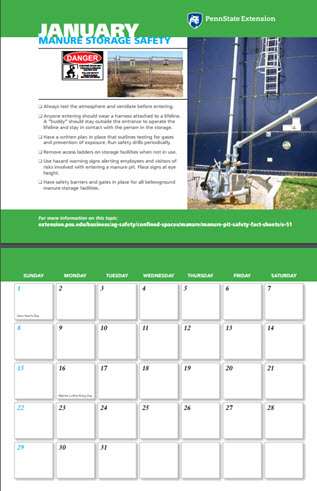Each month highlights potential risks and improvements
By Diego Flammini
Assistant Editor, North American Content
Farms.com
The Penn State Extension Dairy Team and members of the school’s Agricultural Safety and Health Program have teamed up to create a calendar focused on safety around the farm.
Each month will highlight a specific farm hazard and offer suggestions on how to minimize the risks of injury.
The topics include power takeoff, tractor safety, horizontal silos, skid steers and electrical systems.

"A calendar is a great way to keep safety practices front and center for dairy farmers," said Dennis Murphy, Nationwide Insurance professor of agricultural safety and health, in a release. "It is an efficient way to remind dairy workers to keep safety in mind as they go about their daily work."
The calendar features check off lists of possible improvements to monitor safety throughout the year.
"Posting in a prominent area and holding monthly safety meetings to review key points are two ways for dairy managers to encourage safe habits in their workforce," said Lisa Holden, associate professor of dairy science in the Penn State College of Agricultural Sciences, in a release.
Calendars are being sold for $10 and are available through the Penn State Extension.